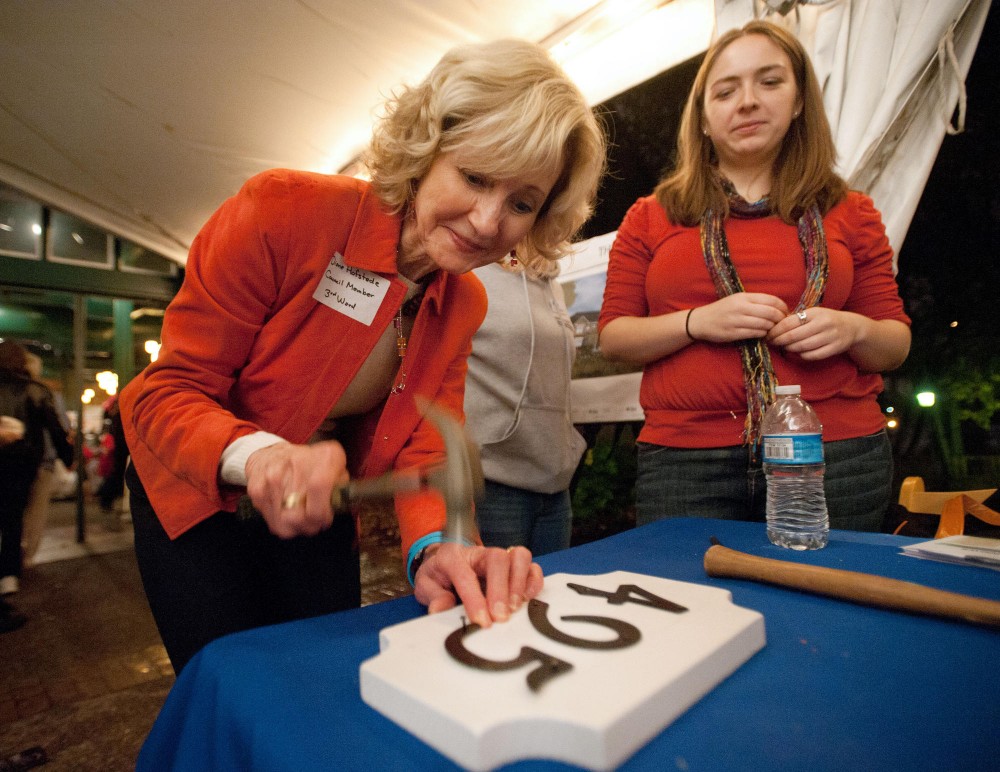Elected in 2005, Diane Hofstede is in her second term as councilwoman of Ward 3 âÄî one of two wards in Minneapolis that encompass the University of Minnesota community.
Stretching from Marcy-Holmes to McKinley in north Minneapolis, the ward consists of nine neighborhoods.
âÄúFrom a socio-economic standpoint, weâÄôre certainly one of the most diverse,âÄù Hofstede said.
But of the 13 wards in the city, HofstedeâÄôs had the third lowest voter turnout in the most recent city-wide election. The low amount of University students who show up at the polls doesnâÄôt help.
Just 4 percent of voters in the Dinkytown precinct cast their ballots in the 2009 election âÄî the lowest in HofstedeâÄôs ward. In the other half of Marcy-Holmes across the Interstate 35W bridge, voter turnout was 11 percent.
In an informal Minnesota Daily survey of 50 University students, three said they knew who Hofstede was.
Despite the challenge of representing students, Hofstede said she stays active in the area through the University District Alliance âÄì an organization that works to improve the UniversityâÄôs relationships with the surrounding neighborhoods.
âÄúJust because people donâÄôt vote doesnâÄôt mean theyâÄôre not engaged,âÄù she said.
Finding politics
Born and raised in Northeast Minneapolis, Hofstede grew up speaking Polish and eventually learned to speak English.
She graduated from St. Cloud State University with a degree in social science and psychology. After earning her masters in educational administration from the University, she worked as a financial adviser.
She married Tony Hofstede, the son of former Minneapolis mayor Albert Hofstede, and got involved in MinneapolisâÄô Neighborhood Revitalization Program and the Minneapolis Public Library Board âÄî through which she played an integral role in the creation of the Downtown Library.
She decided to run for the city council in 2005 and has held the seat in Ward 3 ever since.
âÄòBetter contactâÄô with students
Hofstede cited her participation in the University District Alliance as the main source of her outreach to students.
âÄúWith the Alliance, we have had more and better contact with the students than ever before,âÄù she said.
Phillip Kelly, undergrad representative to the University Alliance, said that although his experiences with Hofstede have been positive, he questions if the Alliance is the most effective way to connect with students.
âÄúThe Alliance is a group of 15-plus people, and right now, IâÄôm the only student who has shown up to meetings for the last seven months,âÄù Kelly said.
âÄúThe student voice on the Alliance has typically not been the strongest âÄî itâÄôs usually been the voice of long-term residents who have dominated the conversation.âÄù
At face-value, Hofstede has typically favored the long-term residents in Marcy-Holmes, Kelly said. He pointed to zoning code issues in the area as a big example.
Hofstede has consistently supported a maximum occupancy ordinance which only allows a certain amount of unrelated people to live in the same house.
Hofstede said that studentsâÄô priorities are important to her.
âÄúOne of my goals is to help students graduate, whether itâÄôs housing issues, drinking or whatever,âÄù she said.
When asked to elaborate on policies geared towards helping students that she has supported, Hofstede struggled to name a specific policy.
Under the microscope
Since starting the job, HofstedeâÄôs office has been constantly changing. While several city councilmembers have retained the same staff, more than a dozen staffers have come and gone from her office.
When asked about the high turnover, Hofstede said that the number of aides who have left is âÄúcloser to four.âÄù Many of the staffers who left were part-time workers or volunteers, she said.
âÄúI think if you look at the work that has been done and the accomplishments that have been made, theyâÄôre still the same, no matter whoâÄôs in the office,âÄù Hofstede said.
She went on to say that she has consistently attended neighborhood meetings, tackled the issue of problem properties in the ward and she has overseen significant reductions in crime.
Doug Carlson, president of the Marcy-Holmes Neighborhood Association, has been very happy with HofstedeâÄôs work in her two terms.
âÄúSheâÄôs been really great. She has the concerns of the residents and neighborhoods at heart,âÄù Carlson said.
Skott Johnson, president of the Dinkytown Business Association, said that Hofstede is in constant contact with them.
âÄúI know that sheâÄôs only a phone call away,âÄù Johnson said.
While few neighborhood associations have complaints about Hofstede, some constituents do.
Some residents of Ward 3 have complained that her constantly changing staff has made it difficult to contact her and question her ability to effectively lead.
Among them is Jason Alvey, who tried to open a specialty beer store in Northeast Minneapolis in 2007. After he called and emailed repeatedly to get an appointment with Hofstede, she canceled.
âÄúMy experience with her was about as bad as it could possibly be. She completely lacked professionalism,âÄù he said. âÄúI was just completely shocked that she holds her position. She treated me like a piece of crap.âÄù
After several months of frustration, he opened the Four Firkins in St. Louis Park, Minn.
When asked about complaints lodged against her, Hofstede said that she âÄúcanâÄôt respond to vague complaints.âÄù
Hofstede said she has been effective in her position and has implemented positive changes in the ward.
âÄúTo the degree possible, I think weâÄôve done a good job,âÄù Hofstede said. âÄúI believe weâÄôve made some great improvements.âÄù








